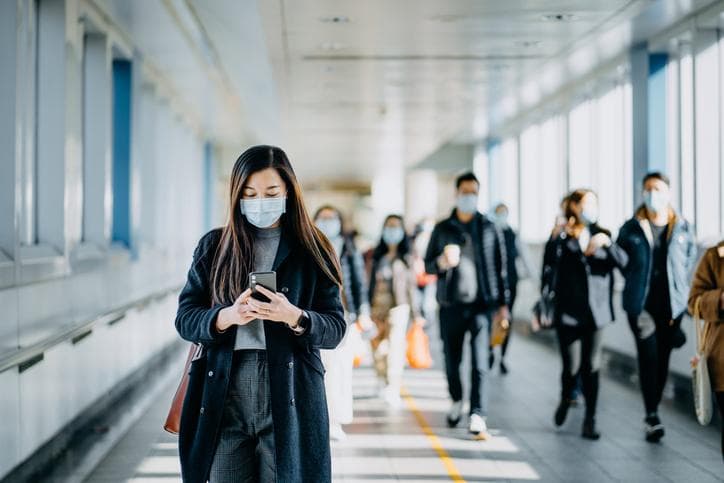
Covid can have serious mental health fallout, but vaccination can help
Massive study of UK health data reveals benefits of Covid-19 vaccination in mitigating a wide range of post-infection serious mental illnesses.
04 November 2024
Share this page
In 2020 and 2021, plenty of attention was paid to how Covid-19 might affect mental health. Much of this coverage was related to the consequences of lockdown, and how social isolation, grief, and financial insecurity might be impacting our wellbeing. Less focus has been given to the mental health ramifications of the illness itself.
Writing in JAMA Psychiatry, a team from the US and UK look at the mental health symptoms associated with SARS-CoV-2 infection — and what difference, if any, vaccination status made.
Drawing from the medical data of over 18 million people registered with GPs in England, the team looked at three separate groups: one consisting of data from the period before vaccination was available; one consisting of data from those who had been vaccinated, excluding patients from the previous cohort; and a final group consisting of data from those who remained unvaccinated even after vaccines were available.
Using these three groups, the team looked at prevalence of depression and serious mental illnesses (defined here as schizophrenia, schizoaffective disorder, bipolar disorder, and psychotic depression) both pre- and post-Covid-19 infection. They also measured the prevalence of anxiety, PTSD, eating disorders, self-harm, and suicide during the same period.
Severity of Covid-related illness was also included in the team's analyses, ranging from those who required no further medical intervention through to those who had been admitted to hospital due to their acute infection, as well as those who passed away due to the illness.
Through their analyses, the team found that the incidence of mental health conditions was higher a week to a month after diagnosis of Covid-19 compared to before contracting it or not getting it at all. This was especially the case following severe cases that had required hospitalisation.
Incidence of depression was up to 1.22 times higher than it was before people contracted Covid, or if they did not contract it at all; in those who were hospitalised, it was up to 16.3 times higher. For people who had been vaccinated, however, the rate of depression after a Covid-19 infection that didn't require hospitalisation was about the same as their depression levels before getting it, or if they never contracted it at all.
Similarly, incidence of serious mental illness increased in the first month after hospitalisation with Covid-19 in both vaccinated and unvaccinated people. Again, the prevalence of these conditions was significantly higher in those who were unvaccinated, compared to those before/without Covid-19 infection. Incidence of serious mental illness was 8.75 times higher in the unvaccinated and hospitalised cohort, and 6.52 times higher in the vaccinated and hospitalised cohort.
Risks remained present for those who were not admitted to hospital for their infection. In those who were not hospitalised and unvaccinated, the risk of developing serious mental illness in those first four weeks following infection was about 49% higher compared to those who hadn't contracted Covid. For those who were vaccinated, this risk was was actually 9% lower compared to that same group.
As for why this was the case, the team suggests that vaccination likely offered protection as intended, reducing disease severity and systemic inflammation, which in turn presumably minimised subsequent symptoms. Given that other research has shown that Covid-19 can have substantial impacts on the brain, this line of thinking makes sense.
They also posited that being vaccinated may convey a number of psychological benefits, such as decreased anxiety about infection and increased levels of social engagement, all of which could protect against poor mental health in a pandemic setting. It's also, however, not totally surprising that hospitalisation could be a significant trigger for poor mental health — being incredibly ill and at risk of losing your life can have profound psychological impacts.
The team notes several possible limitations to the study. For example, unvaccinated people may be less likely to contact health services generally, so much of their data may not have been recorded. Similarly, people with recorded mental health diagnoses may have been more likely to report infection due to increased contact with services. These factors may have skewed results. Taken as a whole, however, the findings clearly illustrate the benefits of vaccination.
Read the paper in full:
Walker, V. M., Praveetha Patalay, Ignacio, J., Denholm, R., Forbes, H., Stafford, J., Moltrecht, B., Palmer, T., Walker, A., Thompson, E. J., Taylor, K., Cezard, G., Elsie, Wei, Y., Marwa Al Arab, Knight, R., Fisher, L., Massey, J., Davy, S., & Amir Mehrkar. (2024). COVID-19 and Mental Illnesses in Vaccinated and Unvaccinated People. JAMA Psychiatry. https://doi.org/10.1001/jamapsychiatry.2024.2339
Want the latest in psychological research, straight to your inbox?
Sign up to Research Digest's free weekly newsletter.


